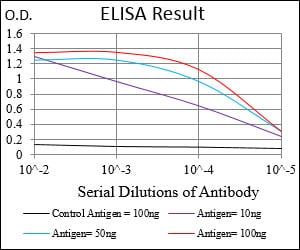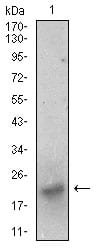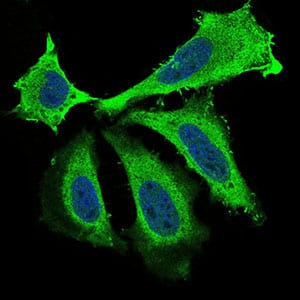


| WB | 咨询技术 | Human,Mouse,Rat |
| IF | 咨询技术 | Human,Mouse,Rat |
| IHC | 1/50-1/100 | Human,Mouse,Rat |
| ICC | 1/50-1/200 | Human,Mouse,Rat |
| FCM | 咨询技术 | Human,Mouse,Rat |
| Elisa | 1/10000 | Human,Mouse,Rat |
| Aliases | ANON2; BULN2 |
| Entrez GeneID | 627 |
| clone | 3D9C5 |
| WB Predicted band size | 27.8kDa |
| Host/Isotype | Mouse IgG1 |
| Antibody Type | Primary antibody |
| Storage | Store at 4°C short term. Aliquot and store at -20°C long term. Avoid freeze/thaw cycles. |
| Species Reactivity | Human |
| Immunogen | Purified recombinant fragment of human BDNF (AA: 19-248) expressed in E. Coli. |
| Formulation | Purified antibody in PBS with 0.05% sodium azide. |
+ +
以下是关于ER beta抗体的3篇参考文献示例(基于公开资料整理,建议通过学术数据库核对原文):
---
1. **文献名称**: "Comparison of ERβ-specific antibodies in human breast cancer"
**作者**: Skliris GP, et al.
**摘要**: 该研究评估了多种市售ERβ抗体在乳腺癌组织中的特异性与敏感性,发现部分抗体存在与ERα或其他蛋白的交叉反应,强调了抗体验证在免疫组化中的重要性。
---
2. **文献名称**: "A systematic validation of ERβ antibody specificity in human tissues"
**作者**: Andersson S, et al.
**摘要**: 通过对多种ERβ抗体的免疫印迹、免疫沉淀及基因敲除组织验证,明确部分抗体在检测ERβ1亚型时特异性较高,而部分抗体无法区分ERβ2等其他异构体。
---
3. **文献名称**: "ERβ in breast cancer—analysis of a novel monoclonal antibody and implications for prognosis"
**作者**: Saal LH, et al.
**摘要**: 开发了一种针对ERβ的C端表位单克隆抗体,验证其在福尔马林固定组织的适用性,并发现ERβ表达与乳腺癌患者生存率的潜在关联。
---
**提示**:实际引用时建议优先选择近年文献(如2015年后)或高影响力期刊(如*Nature Communications*、*Endocrinology*)中经过严格验证的抗体研究,并通过PubMed/Web of Science核对具体实验模型(如人/鼠组织)和抗体货号(如PPG5/鼠抗人ERβ)。
Estrogen receptor beta (ERβ) is a nuclear hormone receptor that mediates the biological effects of estrogen, playing critical roles in reproductive, cardiovascular, immune, and nervous systems. Discovered in 1996. ERβ shares structural homology with ERα but exhibits distinct tissue distribution and functional properties. It regulates gene expression through ligand-dependent and ligand-independent mechanisms, influencing cell proliferation, differentiation, and apoptosis. ERβ is expressed in various tissues, including the ovaries, prostate, lungs, and brain, and has been implicated in both physiological processes and pathological conditions such as cancer, metabolic disorders, and neurodegenerative diseases.
ERβ antibodies are essential tools for investigating its expression, localization, and functional interactions. These antibodies are developed using immunogenic peptides or recombinant proteins corresponding to specific ERβ epitopes, often validated for applications like Western blotting, immunohistochemistry (IHC), immunofluorescence (IF), and chromatin immunoprecipitation (ChIP). Due to high sequence similarity between ERβ and ERα, antibody specificity is a key concern; rigorous validation using knockout models or siRNA-mediated silencing is required to avoid cross-reactivity. ERβ antibodies have advanced research into its tissue-specific roles, ligand-binding dynamics, and crosstalk with other signaling pathways. They are also used clinically to assess ERβ status in tumors, potentially guiding therapeutic strategies. However, variability in antibody performance and standardization across studies remains a challenge, emphasizing the need for reliable reagents and reproducible protocols.
×